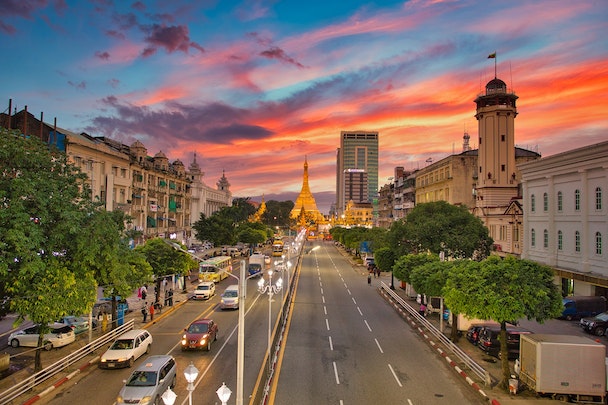State of the Nation: After the coup, Myanmar consumers expect brands to be meaningful
Two years on from Myanmar's military coup, the continuing occupation is forcing brands to take a more intentional approach to marketing, writes Mra Thitsa Than, strategy director, Myanmar & ASEAN at PR and digital marketing agency Vero . Brands need to be more aware and demonstrate a genuine understanding of the reality of Myanmar's situation.

/ Image by Myo Min Kyaw from Pixabay
A transformed society, a resilient young population
On the evening of January 31st, 2021, our team in Yangon hosted an office party to celebrate the successful year that had just ended, despite the gruelling impact of the global pandemic. Business was thriving, gamification, immersive experiences and new tech were on the rise, and the National League for Democracy party was on track to be elected for another term. On February 1st, the Myanmar military seized power, plunging the country into a period of disastrous challenges.

Two years have passed, and we continue to face widespread violence, economic recession, nationwide electricity cuts, limited internet access, curfews, cash shortages, and rising prices. Brands, businesses, and the people of Myanmar have had to adapt to an environment that’s constantly shifting.
Advertisement
Despite these challenges, young people across the country refuse to let the military coup define their futures. Their attitude is one of resilience and hopefulness rather than helplessness and despair. The tenacity, courage, and creativity that I see day in and day out, particularly among young people who are protesting while rethinking and rebuilding their daily lives, gives me the strength to believe that there’s a brighter future ahead.
From taking to the streets to protest, to clanging pots and pans when going outside became too dangerous, to taking our voices online, to resisting through art and consumer activism, I am proud of how we’re constantly evolving in our opposition, adapting and redefining our values in the midst of uncertainty. This, in turn, is shaping how we can and should do communications in Myanmar. The coup has not only changed our communications landscape — it has also transformed our culture.
Advertisement
Rebuilding and redefining our values and culture
Mindsets and behaviors have shifted dramatically from consumerism to consumer activism. When the coup took place, there was a large-scale, immediate, consumer-driven charge to cut all ties with the country’s many military-owned brands. Myanmar Beer, then the most popular beer brand in the country, saw its market share drop dramatically as people began posting about throwing away their products and shunning bars and restaurants that continued to sell it. Within days, the country’s largest retailer, City Mart, stopped selling military-owned brands. This rejection is still prevalent today.
Cultural moments and festivals became avenues for protest and defiance. Once the most anticipated and celebrated moment of the year, the Myanmar new year festival, Thingyan, has become the theater of silent strikes that empty streets throughout the country.
Facebook, a powerful surveillance tool for the military, went from the country’s go-to search engine to being shunned by users. In the many street security check-ups dotting Yangon, soldiers no longer asked for IDs but for Facebook profiles. As a result, people across age groups turned to TikTok, a video platform that doesn’t require a VPN and provides a space to freely and creatively express their grief, frustrations, and hopes — and to have fun.
Following the lead of Myanmar’s young generations
Millennials and GenZ are redefining our collective values, behaviors, and interests to be more inclusive, accepting, and sensitive. As such, they want brands and businesses to reflect the same — and above all, to show a nuanced understanding of the current situation and how it affects all groups.
In the first year of the coup, as consumers’ mindsets and sentiments underwent dramatic shifts, many international brands had to improvise or change their strategies. Those that were slow to change faced immediate negative backlash. While many stayed silent at the beginning, it's clear today that they can no longer be bystanders.
The gruesome impact of the military coup on society is forcing brands to be more aware of their evolving role. From making positive contributions to affected communities, to a more intentional approach to marketing in general, it’s not enough to just be cautious anymore. Burmese people expect brands to be intentional, meaningful, and nuanced in their communication. Cultural moments such as Thingyan and Thadingyut (Lighting Festival) are no longer a free-for-all for brands to leverage in their marketing, as insensitive handling can result in serious backlash.
Advertisement
Young people are now looking beyond what brands are selling. The youth want to see purpose, meaningful insights, and a genuine understanding of the reality of their damaged prospects. A one-size-fits-all campaign approach will fall flat; consumers expect tailored content that aligns with their interests, passions, and values.
I truly believe in the ability of human beings to remake themselves for the better. The coup and the challenges it has created should not define us. If anything, I hope this article is an indication that the people of Myanmar are strong and capable of remaking society and themselves for the better — no matter what their external circumstances may be.
Mra Thitsa Than is the strategy director for Myanmar & ASEAN at PR and digital marketing agency Vero.